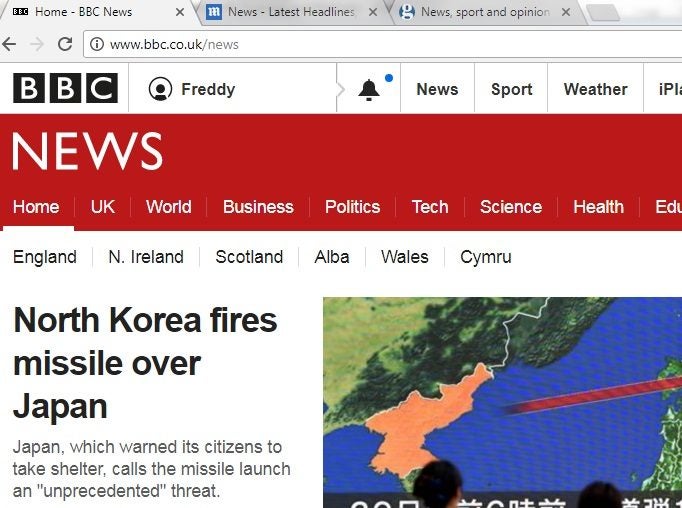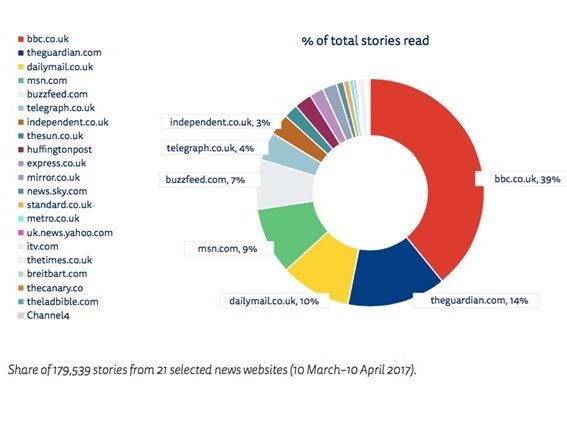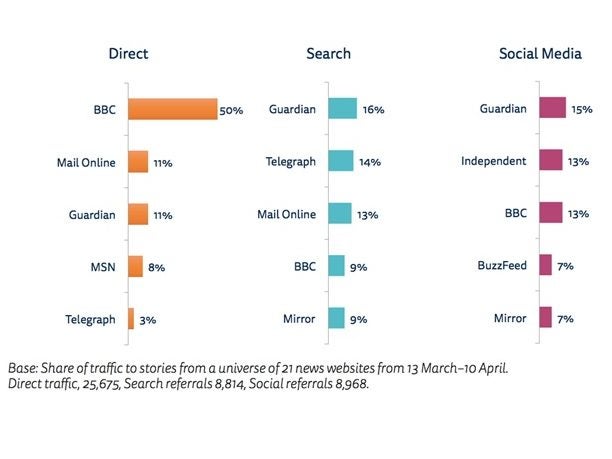
The BBC, Guardian and Mail Online and are dominating news consumption on computers in the UK while the majority of news brands struggle with low engagement, a new study has revealed.
The findings from the Reuters Institute for the Study of Journalism are based on more than 3,400 desktop/laptop users who accessed at least one news story from the top 21 UK news websites from 13 March to 10 April.
The sample group is part of Yougov’s Pulse panel of active computer users who have given the polling company permission to track their online behaviour anonymously.
The three top brands accounted for 63 per cent of the 179,539 stories read by the sample group and 64 per cent of reader engagement (time spent on the website) over the four-week period.
The BBC alone made up 39 per cent of the total stories read, the Guardian 14 per cent and the Daily Mail 10 per cent.
“By contrast other national news brands are struggling with low engagement (time spent) and low levels of loyalty (frequency of use), which may make it hard to attract premium advertisers or charge for content in the future,” a spokesperson said.

Source: Reuters Institute for the Study of Journalism/Yougov
The study found that BBC Online receives the most direct traffic (visits straight to its website), while the Guardian is more effective at driving clicks from both social media and search engines.
It found social media users consume news from a wider variety of sources than those who tended to go directly to a news website or who searched for news content through the likes of Google.
Lead report author Nic Newman said: “Overall, our analysis shows a winner-take-all environment dominated by a few major brands, but also that distributed forms of discovery, such as social media and search, generally point towards more diverse news use than direct discovery.”
The study looked in detail at two case studies in March: the Westminster terror attack and the forceful eviction of a passenger from a United Airlines plane.
It found that three-quarters (76 per cent) of all those who accessed any news story about the Westminster attack used the BBC website and more than half (55 per cent) only used the BBC.
Only 22 per cent of visits to BBC news stories came from social media, search and other links, with 78 per cent coming directly. In contrast the Sun and The Independent websites generated the majority of their traffic via third-party referrals, including search engines and social media.
Overall the Guardian outperformed the BBC in search and social media, The Telegraph and Mail Online performed well for search referrals, with the Independent and BuzzFeed showing strongly in social media, a spokesperson said.
The Independent beat all other brands for both social media and search traffic on the United Airlines story.

Source: Reuters Institute for the Study of Journalism/Yougov
The study also found that live blogs were by far the most popular online format during the first 12 hours of the Westminster attacks, but a 53-second video was the key driver of the United Airlines coverage.
The top 21 UK news websites as defined by the Reuters Institute Digital were used for the study.
The include: the BBC, BuzzFeed, Channel 4, Daily Mail, Huffington Post, Mirror, Sky News, Daily Telegraph, Sun, The Times, Yahoo, Independent, ITV, The Lad Bible, Breitbart, The Canary, Metro, Daily Express, London Evening Standard, Guardian and MSN.
No other news brands were concerned in the study, which also does not include mobile web use, apps, distributed consumption, or news accessed offline.
Email pged@pressgazette.co.uk to point out mistakes, provide story tips or send in a letter for publication on our "Letters Page" blog
